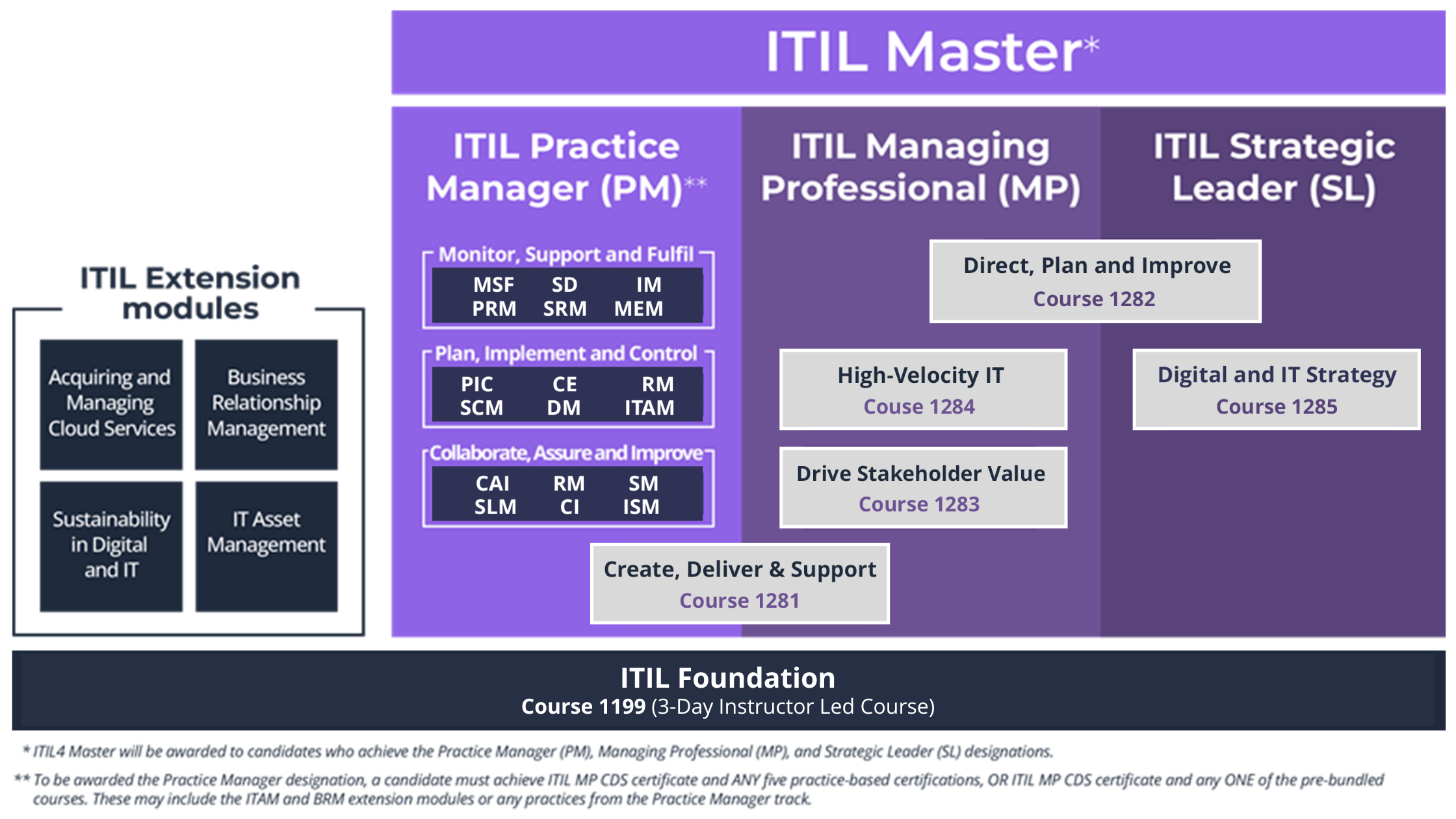Efficient IT service management (ITSM) is essential for organizations adapting to today’s rapidly evolving digital landscape. ITIL (Information Technology Infrastructure Library) is a globally recognized framework that provides a structured approach to aligning IT services with organizational goals, ensuring reliability, efficiency, and continual improvement. In a recent webinar, ITIL Master, Sandy Kelly, explains, “Efficient IT service management (ITSM) is no longer just about keeping systems running—it’s about creating measurable value for businesses”. If you’re an IT professional looking to advance your career, understanding ITIL certification is a key step to becoming a leader in ITSM.
This guide explores the ITIL certification process, its benefits, real-world applications, challenges, and modern relevance.

What is ITIL and How Do I Get Certified?
ITIL provides a comprehensive set of best practices designed to help organizations optimize their IT services and align them with business goals. ITIL 4, the latest version of the framework, builds on its predecessors by incorporating modern methodologies such as Agile, DevOps, and Lean IT. These additions enable IT teams to deliver faster, more efficient services while keeping up with the ever-evolving demands of today’s businesses.
By adopting ITIL 4, organizations can improve collaboration, enhance service delivery, and create more value for their customers.
Certification Pathway
ITIL certification follows a modular structure:
ITIL 4 Foundation
Introduces the ITIL framework and its key concepts, providing a solid foundation in IT service management. This includes a focus on practices like Agile, DevOps, and how they integrate with ITIL to improve efficiency and collaboration in organizations.
ITIL Managing Professional (MP)
The ITIL 4 Managing Professional designation is designed to provide IT practitioners with the practical and technical skills needed to manage IT-enabled services effectively in dynamic and complex environments. It comprises four key modules: “Create, Deliver and Support,” “Drive Stakeholder Value,” “High-Velocity IT,” and “Direct, Plan and Improve.” These modules focus on equipping professionals to optimize workflows, engage stakeholders, and adapt to high-velocity business demands, making IT a vital contributor to organizational success.
ITIL Strategic Leader (SL)
The ITIL 4 Strategic Leader designation emphasizes the strategic role IT plays in driving business success. To earn this designation, candidates must complete two modules—“Direct, Plan and Improve” and “Digital and IT Strategy.” This certification highlights the importance of aligning IT objectives with overall business goals, enabling organizations to leverage IT as a core driver of growth, operational efficiency, and long-term success (Axelos, n.d.).
ITIL Practice Manager
The ITIL Practice Manager certification plays a crucial role in modern IT service management. As Kelly highlights, "The ITIL Practice Manager certification emphasizes the importance of aligning IT practices with business goals to deliver consistent value." This certification is designed to bridge the gap between IT operations and business strategy, ensuring that IT services are not only efficient but also aligned with organizational objectives.
ITIL Master
To achieve the ITIL 4 Master designation, candidates must successfully complete the Practice Manager, Managing Professional, and Strategic Leader certifications. This highest level of ITIL certification highlights a candidate’s ability to apply ITIL principles across strategic, tactical, and operational levels. It also involves assessments on Digital and IT Strategy, detailed study of management practices, and mastery of cross-functional implementation skills. The designation demonstrates extensive expertise in ITSM, showcasing practical knowledge and leadership in implementing ITIL best practices to support organizational growth and success.
ITIL Certification Pathway Flowchart:

The ITIL® 4 Roadmap provides a clear and structured pathway for individuals pursuing ITIL 4 certifications, beginning with the ITIL Foundation (Course 1199). This entry-level certification introduces the fundamentals of ITIL and serves as the starting point for all learners.
After completing the Foundation level, candidates can choose specialized tracks to develop expertise in key areas of IT service management. The ITIL Practice Manager (PM) track focuses on three core domains: "Monitor, Support and Fulfill," "Plan, Implement and Control," and "Collaborate, Assure and Improve." This track emphasizes practical skills, requiring candidates to complete certifications based on real-world IT practices.
The ITIL Managing Professional (MP) track is designed for those who manage and deliver IT services. It includes four essential courses: "Create, Deliver & Support" (Course 1281), "Direct, Plan and Improve" (Course 1282), "Drive Stakeholder Value" (Course 1283), and "High-Velocity IT" (Course 1284).
The ITIL Strategic Leader (SL) track addresses leadership and strategic planning in IT organizations. It consists of two courses: "Direct, Plan and Improve" (Course 1282) and "Digital and IT Strategy" (Course 1285).
In addition to these tracks, ITIL offers Extension Modules that cover emerging areas such as cloud services, sustainability, business relationship management, and IT asset management. These modules allow learners to explore topics relevant to modern IT environments.
For those aiming for the pinnacle of ITIL expertise, achieving both the ITIL Managing Professional (MP) and ITIL Strategic Leader (SL) certifications qualifies candidates for the prestigious ITIL Master designation—the highest level of ITIL certification.
This roadmap provides a step-by-step guide for professionals to advance their skills and align with the demands of today’s dynamic IT landscape.
Real-World Examples of ITIL Benefits
Case Study Summary: ITIL Implementation at a Global Consulting Firm
A global management consulting firm faced challenges in improving IT service management for its distributed workforce and clientele. Recognizing the need for enhanced internal processes, the firm adopted the ITIL® framework. Learning Tree was selected to provide tailored ITIL training that combined standard ITIL® Foundation courses with real-world scenarios, enabling employees to apply concepts effectively in their roles.
Key elements of the solution included live team training delivered globally, customized case studies for context, additional facilitation days, and post-training coaching for practical implementation. Over 18 months, Learning Tree ran 26 training events for over 600 employees, achieving a 99% certification exam pass rate. The initiative not only enhanced the firm's IT service management capabilities but also equipped its workforce with actionable skills for service improvement.
This case demonstrates how ITIL delivers measurable improvements in service quality and operational efficiency.
(Learning Tree Case Study, https://cdn.buttercms.com/M3sB13jgTS29ek0sGw6i)
Workforce Demand
ITIL-certified professionals are in high demand across various industries, as organizations increasingly rely on them to streamline IT services and improve overall efficiency. Common roles include IT Project Manager, Service Desk Analyst, and Service Delivery Manager, each contributing to the effective implementation of ITIL practices. For example:
- Help Desk Analyst: This role focuses on providing frontline IT support, troubleshooting technical issues, and ensuring smooth operations. Professionals in this position earn a national average salary of $47,029 per year (Indeed.com, 2025).
- IT Project Manager: Responsible for managing IT projects from conception to completion, IT Project Managers ensure that projects meet deadlines, stay within budget, and align with organizational goals. The national average salary for this role is $105,324 per year (Indeed.com, 2025).
- Service Delivery Manager: This role involves overseeing the delivery of IT services to clients or internal stakeholders, ensuring that quality standards are met and that services are provided efficiently. Professionals in this role earn a national average salary of $97,838 per year (Indeed.com, 2025).
These positions not only offer competitive salaries but also provide opportunities to make a significant impact on an organization's IT infrastructure. These examples clearly demonstrate how ITIL certification drives measurable improvements in operational efficiency, while also supporting meaningful career growth for professionals in the IT field.
Benefits of ITIL Certification
ITIL certification provides multiple advantages for both professionals and organizations:
1. Enhanced Skills in ITSM
Certification equips you with actionable strategies for incident management, service delivery, and continual improvement, enabling you to effectively manage and optimize IT services in any organization. These strategies provide a framework for aligning IT services with business goals, improving efficiency, and enhancing customer satisfaction.
For example, ITIL practices such as “change enablement” are designed to minimize risks and reduce service disruptions during software updates or system changes, ensuring smoother transitions and greater reliability in IT operations.
2. Integration of Modern Methodologies
Agile: ITIL 4 incorporates iterative service delivery, emphasizing flexibility and adaptability to help organizations respond quickly to changing requirements and deliver value incrementally.
DevOps: Promotes stronger collaboration between development and operations teams, breaking down silos to streamline workflows, improve communication, and accelerate the delivery of high-quality services.
Lean IT: Focuses on reducing waste, optimizing IT processes, and maximizing efficiency by identifying and eliminating non-value-added activities within IT operations, ensuring a more streamlined and cost-effective approach.
3. Building Credibility
ITIL-certified professionals often lead cross-functional teams and secure leadership roles. For example, an ITIL-certified project manager might oversee a team of developers, designers, and analysts to implement a new IT service management system within an organization.
4. Alignment with Best Practices
ITIL incorporates frameworks such as PESTLE to help organizations identify and analyze external risks and opportunities that may impact their operations or strategic goals (Axelos, n.d.). PESTLE stands for Political, Economic, Social, Technological, Legal, and Environmental factors, offering a structured and comprehensive approach to evaluating the external environment.
By examining these six key areas, businesses can better understand how external influences may affect their performance, competitiveness, and long-term objectives. For example, political factors might include government regulations or trade policies, while technological factors could involve advancements in innovation or emerging industry trends. This holistic analysis enables organizations to make informed, strategic decisions that align with their goals while proactively addressing potential challenges.
Overcoming ITIL Certification Challenges
While ITIL certification is rewarding, it comes with challenges like time investment, costs, and a steep learning curve. Here are tips to overcome them:
- Balance Work and Study: Juggling work and study can be challenging, so it's important to set realistic goals and create a schedule that works for you. Use flexible study options like online training platforms or mobile apps, which allow you to learn at your own pace, even during commutes or breaks. Setting small, achievable milestones can help you stay motivated and track your progress.
- Manage Costs: Professional certifications can be costly, so focus on the ones that are essential to your career goals, like the ITIL 4 Foundation certification. Look for ways to save money, such as employer sponsorships, discounts, or bundled courses. Many programs, like PeopleCert’s Take2 initiative, also offer vouchers for exam retakes, ensuring you have a backup plan if needed. This can reduce financial stress and increase your confidence.
- Choose the Right Level: Picking the right certification level is key. Beginners should start with entry-level certifications, like ITIL Foundation, to build a strong knowledge base. For experienced professionals, transition modules or advanced certifications can help deepen expertise or expand into new areas. Assess your current skill level and career goals to determine the best starting point for your certification journey.
ITIL 4’s Modern Relevance
The ITIL ecosystem continues to evolve, adapting to emerging technologies and trends like AI, IoT, and cloud computing. These advancements are reshaping the way organizations deliver efficient and reliable IT services:
- AI in ITSM: Artificial intelligence is transforming IT service management by automating tasks such as incident detection, resolution, and response.
This greatly reduces downtime and improves service reliability by enabling faster and more accurate troubleshooting processes. Recently published in CIO, the firm, Freshworks found “a 26.55% decrease in average first response time, demonstrating the value of AI in ITSM.” AI-powered chatbots and virtual assistants are also enhancing user support by providing instant solutions to common issues.
- IoT Management: The Internet of Things (IoT) adds complexity to service management, with countless interconnected devices needing seamless integration into IT frameworks.
ITIL provides best practices to help organizations manage these devices effectively, ensuring they are secure, reliable, and aligned with broader business goals. This guidance supports the growing reliance on IoT for operational efficiency and innovation.
- Cloud Services: As businesses increasingly adopt cloud-based solutions, ITIL offers valuable resources to help manage virtual infrastructures.
Modules like “Acquiring & Managing Cloud Services” provide clear guidance on cloud service lifecycle management, including procurement, deployment, and optimization. By following these practices, organizations can ensure scalable, cost-effective, and secure cloud environments.
- ITIL 4 and ServiceNow Implementation: ITIL 4 is the backbone of an effective ServiceNow implementation, providing a framework that aligns IT service management (ITSM) with business goals.
ServiceNow, a leading ITSM platform, streamlines workflows, automates tasks, and delivers innovative solutions—key principles of ITIL 4. By applying ITIL 4 practices like incident management, change enablement, and service request management, organizations can maximize the efficiency and value of their ServiceNow deployments. This alignment ensures consistent service delivery, improved user satisfaction, and better IT governance. With ITIL 4 as a foundation, businesses can fully leverage ServiceNow to drive digital transformation and operational excellence.
By addressing these cutting-edge trends, ITIL 4 remains a vital framework for modern IT service management, equipping organizations to navigate the challenges of a rapidly evolving digital landscape.
Final Thoughts
Whether you’re new to IT service management (ITSM) or a seasoned professional, ITIL certifications are a valuable asset to help you stay competitive in today’s rapidly evolving IT landscape. These certifications provide a structured approach to ITSM, equipping you with the knowledge and tools to optimize processes, improve service delivery, and align IT services with business needs.
Beyond building valuable skills, ITIL certifications are also known to enhance career opportunities and significantly boost earning potential. Organizations value certified professionals who can drive efficiency and deliver exceptional results. Start your ITIL journey today to gain a deeper understanding of ITSM frameworks and play a key role in helping your organization achieve excellence in service management.
Take the next step in advancing your IT career with globally recognized ITIL certifications. Learning Tree International offers comprehensive ITIL 4 courses tailored to your needs.


